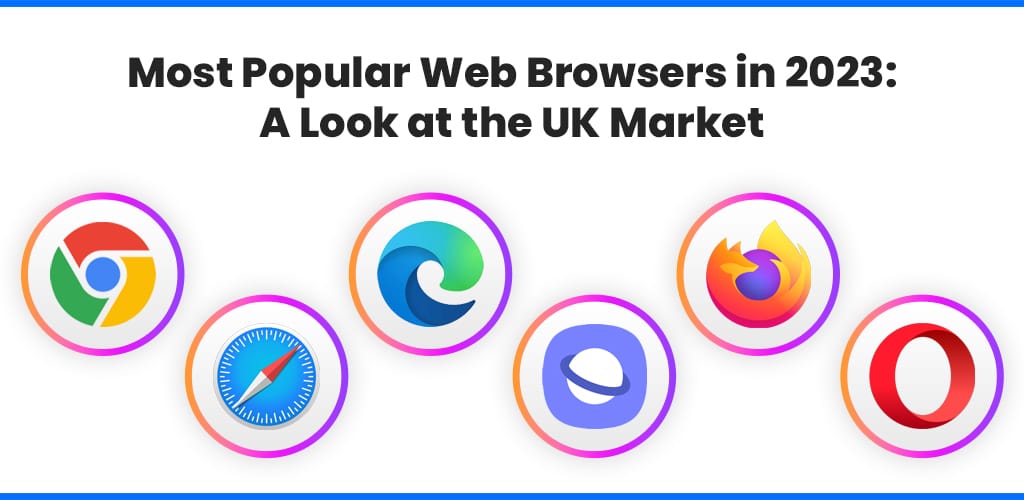Most Popular Web Browsers In 2023: A Look At The UK Market
Examining the 2023 Web Browsers That Are Most Popular
Web browsers are the portal to the internet in the quickly changing digital world, providing easy access to communication, entertainment, and information. The web browser landscape changes constantly as technology progresses and consumer tastes change.
To maximise your e-commerce site for online sales, you need to know how customers view it. This suggests that you will need to know which browsers are most commonly used by users.
A number of browsers surfaced as leaders in 2023, each with special features and functionalities designed to cater to a range of user requirements.

Google Chrome: Maintaining Dominance
In 2023, Google Chrome—kept up its dominant position with a 64.73% global market share. It is the most used internet browser worldwide. Millions of people throughout the world continued to choose Chrome which is renowned for its quickness, ease of use, and wealth of features. Many people’s preference for it as their browser of choice was cemented by its rigorous security features, synchronisation between devices, and user-friendly UI.
For the UK market it was not much of a difference, 51.56% of users used Google Chrome.
Chrome’s success was aided by its continuous updates and improvements. Its performance was improved by the incorporation of cutting-edge technology like machine learning and artificial intelligence (AI), which provided efficient browsing and personalised experiences.
Apple Safari: Innovating for Apple Ecosystem Users
Catering predominantly to Apple device users, Safari continued to be a prominent browser in 2023. Its integration with macOS and iOS, coupled with features like Intelligent Tracking Prevention for enhanced privacy, bolstered its appeal among Apple loyalists.
Safari’s commitment to energy efficiency and optimized performance on Apple devices remained a hallmark, ensuring a seamless and responsive browsing experience for users within the Apple ecosystem.
It gained 18.56% of the marketplace worldwide, while in the UK it had a share of 31.19%.
If we consider the gap separating Google Chrome and Safari is significantly smaller in the UK market than on a global scale.
Microsoft Edge: Evolving for Efficiency
Thanks to its integration with the Windows ecosystem and ongoing enhancements to its functionality and performance, Microsoft Edge achieved notable progress in 2023 and gained popularity among consumers. The browser’s flawless integration of Microsoft services and compatibility with Windows 11 made it a formidable competitor.
Users looking for a more efficient browsing experience were drawn to Edge because of its emphasis on productivity and efficiency, which was evident in features like Collections, vertical tabs, and seamless connection with Microsoft Office programmes.
Edge has a 4.97% market share globally while in the UK it has a huge influence on users with a market share of 8.23%.
Mozilla Firefox: A Commitment to Privacy
Despite facing stiff competition, Mozilla Firefox retained a loyal user base in 2023, with a market share of 3.36% largely due to its strong emphasis on privacy and security. Firefox’s commitment to user data protection, with features like Enhanced Tracking Protection and strict anti-tracking policies, appealed to individuals seeking a more private browsing experience as a result it had a share of 3.04% in the UK market share.
Moreover, Firefox’s open-source nature attracted tech enthusiasts and developers. Its customizable interface and support for various extensions continued to be distinguishing features, catering to users looking for a browser they could tailor to their preferences.
Other Niche Browsers: Emphasizing Privacy and Specialized Features
Opera maintains a consistent user base despite not being as popular as some of its more established rivals, particularly with those looking for special features and functionalities. Opera managed to gain a 2.86% share globally despite fierce competition thanks to its emphasis on privacy, integrated messaging services, and customisable interfaces, which made it appealing to specific user niches. Its UK share was 1.25%.
Last but not least was Samsung Internet, the proprietary web browser developed by Samsung for its Android devices, which continued to gain traction in the browser market. With its integration across Samsung smartphones and tablets, it secured a notable 2.59% market share, particularly among users within the Samsung ecosystem.
Its emphasis on optimized performance for Samsung devices, enhanced privacy features, and seamless synchronization with other Samsung services contributed to its popularity. Samsung Internet’s presence as a pre-installed browser on Samsung devices ensured a significant user base, solidifying its position among the variety of browsers available in the market. This is evident in the UK market as it had a major share of 3.42% which is more than Firefox and Opera.
Alongside the major players, niche browsers like Brave gained attention in 2023, focusing primarily on user privacy and security. Brave’s innovative approach with built-in ad-blocking and a rewards system for users opting into viewing ads garnered interest among privacy-conscious individuals.
Conclusion
In 2023, the landscape of web browsers remained diverse, with each browser catering to specific user preferences and needs. While Google Chrome maintained its dominance with its robust features and performance, browsers like Firefox, Edge, and Safari continued to carve their niche by emphasizing privacy, integration, and specialized functionalities. Niche browsers also thrived, offering innovative solutions for users seeking enhanced privacy and unique browsing experiences.
As technology advances and user expectations evolve, the competition among web browsers will likely intensify, leading to further innovations and improvements, ultimately benefiting users with more choices and enhanced browsing experiences.



DropShip products from verified suppliers to diversify your inventory and scale your eCommerce business